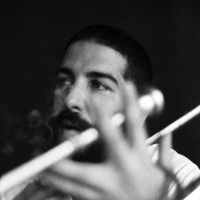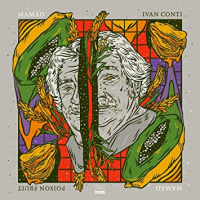Jazz Articles
Our daily articles are carefully curated by the All About Jazz staff. You can find more articles by searching our website, see what's trending on our popular articles page or read articles ahead of their published dates on our future articles page. Read our daily album reviews.
Sign in to customize your My Articles page —or— Filter Article Results
Nicola Conte: Umoja

by Chris May
Nicola Conte continues on his journey from acid-jazz bohemian to spiritual-jazz sophisticate with this immaculately hip album, fronted on half of its tracks by London-based soul-jazz divas Zara McFarlane and Bridgette Amofah. Conte began his trajectory with the acid-jazz template Jet Sounds (Schema, 2000), boosted it with Jet Sounds Revisited (Schema, 2002) and, after a brief post-hard-bop detour with Other Directions (Blue Note, 2004), began the spiritual-jazz ascent which has in 2023 reached its new, lofty apogee with ...
read moreHermeto Pascoal: Planetario Da Gavea

by Chris M. Slawecki
Planetario Da Gavea is an enormous, sprawling document from a February 1981 outdoor performance series by Brazilian jazz wizard Hermeto Pascoal recorded under the stars in the Gávea neighborhood of Rio de Janeiro, within the dome of the city's outdoor planetário (planetarium). Ten pieces, most never recorded before and several never performed again, stretch across two hours of gloriously inspired, indulgent sound featuring the composer, instrumentalist, and sorcerer who Miles Davis once famously called “one of the most ...
read moreMarcos Resende & Index: Marcos Resende & Index

by Chris M. Slawecki
This debut, eponymous recording by Brazilian keyboard wizard Marcos Resende was recorded in Rio de Janeiro in late summer 1976. This was a truly glorious time for progressive instrumental music in Brazil, as you can hear in the discographies of Eumir Deodato, Marcos Valle, Airto Moreira and many other artists. Resende put together a new quartet, equally adept in jazz and Brazilian rhythms, for these sessions: Rhythm aces Rubão Sabino (bass) and Claudio Caribé (drums), plus legendary reedman ...
read moreAntonio Neves: A Pegada é Essa (The Sway Now)

by Chris M. Slawecki
A Pegada Agora É Essa (The Sway Now) illustrates why multi-instrumentalist, composer and arranger Antonio Neves creates such commotion in modern Brazilian music. His second release as a leader, The Sway Now weaves a thick tapestry of Brazil's 2021 musical landscape in bold and brash, overlapping and overflowing colors. It threads together generations of Brazilian musicians, from legendary saxophonist Leo Gandelman to younger lions such as singer Alice Caymmi (Danillo's daughter and Dorival's granddaughter) and double-bassist André Vasconcellos, ...
read moreCry Babies: Cry Babies

by Chris M. Slawecki
History hasn't left behind many traces of Cry Babies--its 1969 debut has until now been extraordinarily difficult (and expensive) to find on vinyl--other than these sounds. Most musician credits only list first names except for organ player Sérgio Carvalho and producer Durval Ferreira, whose career also includes work with Eurmir Deodato and Sergio Mendes. Saxophonist Oberdan Magalhães gets credit for the arrangements and for playing on them. Cry Babies throws itself so quickly and passionately into “It's My ...
read moreEumir Deodato: Os Catedraticos 73

by Chris M. Slawecki
In 1973, Eumir Deodato was riding high upon the GRAMMY® Award-winning success of “Also Sprach Zarathurstra (Theme from 2001: A Space Odyssey)," the Brazilian keyboardist's jazz-rock fusion take on Richard Strauss' classic, from his previous release Prelude (CTI, 1972). Deodato's next move, Os Catedráticos 73 doesn't mess with that successful formula but throws a lot more of his own keyboard playing on top. For its rhythm tracks, Deodato recorded a Brazilian rhythm machine featuring himself with bassist Sergio ...
read moreIvan Conti: Poison Fruit

by Chris M. Slawecki
If the music on his fourth solo album Poison Fruit is a true indicator, Ivan “Mamão" Conti hasn't lost his uncanny producer's ear or instrumentalist's touch for clubbers or dancers in Brazil. A legendary bandleader, percussion and drum player, and composer, Mamão sweetens Poison Fruit by letting it ripen in the hands of two younger, next generation translators / ambassadors: Mamão's son Thiago Maranhão, who oversaw this set's five bonus remixes; and keyboardist Daniel Maunick, son of Jean-Paul “Bluey" Maunick ...
read moreEumir Deodato: Os Catedraticos 73

by Mark Sullivan
Composer/arranger/keyboardist Eumir Deodato is best known for a series of albums on the CTI label, notably Prelude (CTI Records, 1973) and Deodato 2 (CTI Records, 1973). Os Catedraticos 73 dates from the same period, and employs many of the same musicians. It was recorded between Rio de Janeiro and New York, featuring a Brazilian rhythm section including Azymuth drummer Ivan 'Mamão' Conti, percussion master Orlandivo, and bassist Sergio Barroso, while the horn section features some of New York's top brass ...
read moreAmaro Freitas: Rasif

by Chris M. Slawecki
In the small coastal city of Recife, in the Brazilian state of Pernambuco, Amaro Freitas began playing piano in his local church at age 12. A few years later, the jazz gods intervened in the form of a Chick Corea concert DVD. “He completely blew my mind," Freitas once recalled. “I'd never seen anything like it but I knew that's what I wanted to do with a piano." The refocused Freitas became resident pianist at Brazil's legendary jazz bar Mingus ...
read moreAmaro Freitas: Rasif

by Mark Sullivan
Brazilian pianist/composer Amaro Freitas is from the coastal city of Recife in the northeastern state of Pernambuco. His geographic background is important, because he has been heavily influenced by the Afro-Brazilian maracatu (dating from slavery days) and the high intensity carnival rhythms of frevo and baião, as well as the jazz tradition. Most of this album is played by the Amaro Freitas Trio, his group with drummer Hugo Medeiros and double bassist Jean Elton. Opener “Dona Eni" immediately ...
read more















